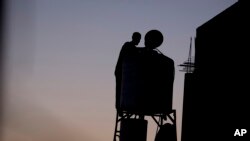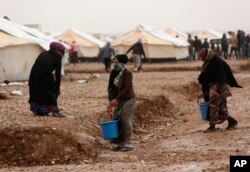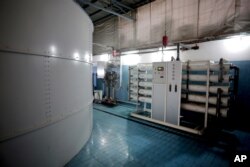The Middle East and North Africa region loses about $21 billion each year because of an inadequate supply of water and sanitation, the World Bank said Tuesday, warning that urgent action is needed to prevent ripple effects on stability and growth.
Poor management of water resources and sanitation in the world's most water-scarce region costs about 1 percent of its annual gross domestic product, with conflict-hit states losing as much as 2 to 4 percent each year, the bank said in a report issued at the World Water Week conference in Stockholm, Sweden.
Deaths due to unsafe water and sanitation in some parts of the region, particularly countries affected by conflict, are higher than the global average, it added.
"As the current conflict and migration crisis unfolding in the Middle East and North Africa shows, failure to address water challenges can have severe impacts on people's well-being and political stability," the report said.
Peril in Yemen
In Yemen, which is reeling from more than two years of conflict, water supply networks serving its largest cities are at risk of collapse due to war-inflicted damage and disrepair, and about 15 million people have been cut off from regular access to water and sanitation, the U.N. children's agency (UNICEF) said in a separate statement Tuesday.
In Syria, where the conflict is well into its seventh year, water has frequently been used as "a weapon of war," with pumps deliberately destroyed and water sources contaminated, and about 15 million people are in need of safe water, including an estimated 6.4 million children, UNICEF said.
Overall, 183 million people lack access to basic drinking water in countries affected by conflict, violence and instability around the world, it added.
Better management
With the urban population in the Middle East and North Africa expected to double by 2050 to nearly 400 million, a combination of policy, technology and water management tools should be used to improve the water situation, the World Bank report said.
"Water productivity — in other words, how much return you get for every drop of water used — in the Middle East in general is the lowest on average in the world," said Anders Jägerskog, a specialist in water resources management at the World Bank and one of the report's authors.
Middle Eastern and North African countries are using far more water than can be replenished, said the report.
To reverse the trend, technology and innovation are "essential but not enough," Jägerskog told the Thomson Reuters Foundation. Water governance — in particular, water tariffs and subsidies — must also be addressed, he said.
The region has the world's lowest water tariffs and spends the highest proportion of GDP on public water subsidies. Such policies lead to excessive use of already scarce water supplies and are not sustainable, said Jägerskog.
Untreated wastewater
Another challenge is that more than half of the wastewater collected in the region is fed back into the environment untreated.
"Along with better water management, there is room for increasing the supply through nonconventional methods such as desalination and recycling," Guangzhe Chen, senior director of the World Bank's global water practice, said in a statement.
Improved water management could bring considerable financial returns, the report noted.
Governments could gain $10 billion annually by improving the storage and delivery of irrigation water to users, while increasing agricultural production by up to 8 percent, the report said.
Egypt, Syria and Iran — which have the largest proportion of irrigated land in the region — are the countries that could benefit most.







